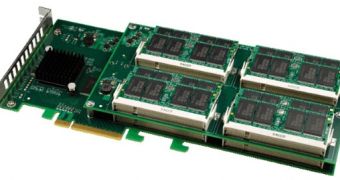Ever since solid state drives started being used, their greatest asset has been the very high speed capabilities they have, compared with hard drives. Unfortunately, on the SATA interface, they were, and are, faced with the inevitable data-transfer bottleneck. To somehow circumvent this limitation, companies such as OCZ started experimenting with SSDs capable of interfacing with the much faster PCI Express interface. For OCZ, this led to the creation of the Z-Drive Series, which has now seen its second rendition.
The first wave of Z-Drives was definitely fast and capacious, but it had, like all other PCI Express SSDs, a significant drawback, namely the fact that it was not bootable. This meant that the drives were excellent choices for enterprise applications in need of instant data access, but they could not serve as containers for the OS. With the Z-Drive R2, however, OCZ has finally overcome this hurdle, which is in itself a significant feat. Still, the company didn't seem to think this was even close to good enough, which is why it went ahead and implemented a series of special features that enhanced performance and flexibility.
Through the use of optimized NAND modules, the memory- and storage-solution developer managed to bring about maximum transfer rates of up to 1.4GB/s, as well as a durability and reliability superior to those of hard drives. Not only that, but the R2 even has interchangeable NAND modules instead of permanent, surface-mounted NAND, a feature “designed to make the Z-Drive field-serviceable and field-upgradeable.”
“Our 4th generation PCIe SSD, the Z-Drive R2, tackles the performance challenges facing enterprise IT professionals head-on” Ryan Petersen, CEO of the OCZ Technology Group, said. “The Z-Drive R2 is a total solution that delivers exceptional performance over a wide of range of applications due to its superior sequential performance, making it a winner in both high IOP and high-throughput environments. In addition, it is the only bootable and field serviceable PCIe SSD option on the market today, and due to an innovative interchangeable module design, it enables low cost field upgradability and capacity increases giving storage architects unprecedented flexibility.”
The Z-Drive R2 m84 and Z-Drive R2 p84 have capacities of 256GB-1TB and read/write speeds of 800/750MB/s and /850/800MB/s, respectively. Finally, the Z-Drive R2 p88 has capacities of 1TB-2TB and read/write speeds of 1.4GB/s. As for prices, not all are known, but the 2 TB Z Drive 2 Series p88 can be found listed with a tag of $10,270.

 14 DAY TRIAL //
14 DAY TRIAL //